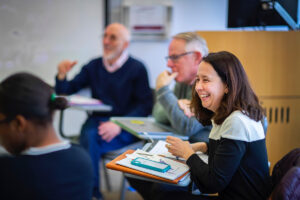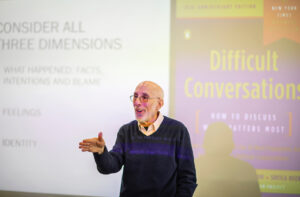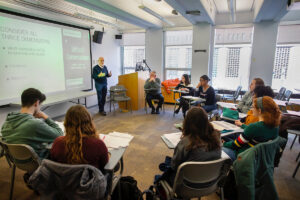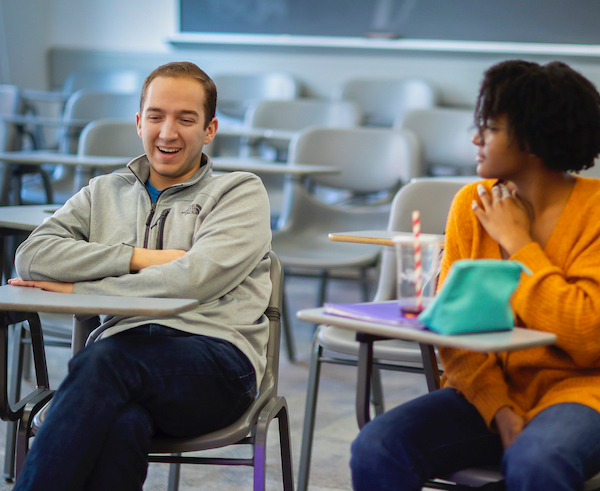Growing up in Ebensburg, a three-stoplight town of about 3,000 nestled in the mountains of western Pennsylvania, Connor Gibson knew the benefits of a tight-knit community and also knew there wasn’t much diversity there to challenge his way of thinking.
So when Gibson, who will be a junior at the Wharton School in the fall, heard about the new SNF Paideia Program at Penn, he was particularly intrigued by a course called Can We Talk? Courageous Civility, Troubled Times. The course, co-taught by Lia Howard of the Paideia Program; Chris Satullo, a journalist and co-founder of the PA Project for Civic Engagement; and Harris Sokoloff of the Graduate School of Education, aimed to help students explore attributes of civil dialogue and learn skills that could be used in a variety of settings to engage with others to seek deeper understanding of ideas and actions.
The course didn’t disappoint, he says.
“I think the most rewarding part of the class is to hear people’s different life experiences because, coming from my pretty small town, there aren’t a whole lot of different backgrounds,” Gibson says.
One of the most amazing things about coming to Penn is just the extraordinary differences in people that it has. And this class allowed me to engage with them on a much deeper level than I might have had to have a chance to do otherwise.
Howard says she and her co-instructors hoped the students would learn many things, among them to listen well, to be attuned to the nuances of both building and engaging in intentional conversation, and to recognize some of the enduring debates embedded into U.S. political culture.
“We hoped they would learn to trust each other and create a courageous space where they could be vulnerable and yet speak authentically,” Howard says. “That is a hard balance. The students far exceeded our expectations. They were ready to go places when given tools and practice using those tools. We were deeply impressed by them.”

The class is part of the SNF Paideia Program, which was established at Penn in March 2019 with a $6 million gift from the Stavros Niarchos Foundation. It reimagines the ancient Greek ideal of Paideia—“education of the whole person”—for the 21st century and beyond, with courses focusing on wellness, service, and citizenship.
Even before he enrolled in the Can We Talk? class, Gibson was interested in having tough conversations about current events and controversial topics. Last summer, he hosted discussions with high school friends in his backyard fire pit. He would research topics online and pass around different positions on it over email, and they would all gather at 8 p.m. to discuss around the fire. Sometimes the discussions would last until 2 a.m., he says. He hosted more than a dozen such fireside chats over the summer.
The Can We Talk? class was small, fewer than 10 students, which Gibson says helped promote in-depth discussions and gave students a chance to really engage with each other and hear different points of view.
The class held a number of events in the broader community to spark discussions about a variety of potentially divisive topics, like universal health care and climate change.

For Gibson, one of the most memorable parts of the course was an event sponsored by the class earlier in the semester, before campus closed over the viral outbreak, called the Can We Talk Forum, sponsored by the Gamba Family Red and Blue Exchange, an initiative of the SNF Paideia Program.
It brought together people of various backgrounds from the Philadelphia community and from other universities and schools in the region.
“It’s one thing to talk in the classroom about the costs of universal health care and how to manage a budget for some large social programs from a mathematical standpoint, and that’s wonderful,” he says. “But in this forum we talked to people whose financial situations were such that Medicare for All would be a life-changing policy for them. It brought a human perspective to the somewhat abstract thing we talked about in the classroom.”
Howard says she’s “delighted” to know how much Gibson feels he benefited from the class.
“We were deeply fortunate to have him in the class and are so grateful for his authenticity and the way he worked to build and sustain the community in our classroom,” she says. “He suggested to us early in the course that we go eat dinner together as a class in the dining hall. We really wanted to do that, and I was going to bring my three daughters and my husband [Penn’s chaplain, Chaz Howard], but then we had to leave campus. It goes to show that Connor is a community builder. He is going to continue to do wonderful things at Penn and beyond.”
Gibson is the first student at his high school to attend an Ivy League university in more than 40 years, and in the fall his younger brother will join him at Penn as a freshman.

With the current tone of political divisiveness in America, the Can We Talk? course is particularly useful, Gibson says.
“I think this is among the most valuable classes I’ve taken during my time as an undergraduate,” he says. “No matter what discipline you find yourself in, whether it’s a community leader or in politics, the private sector or even just in your private life with family members, you’re going to need to have tough conversations,” he says.
This class gives you the tool set necessary to come out of those conversations successfully and teaches you how to be a more effective communicator. I think the skills I learned in Can We Talk? will continue to pay dividends for years to come.
“Can We Talk? A class on civility teaches how to have tough conversation.”
Originally published in Penn Today, May 11, 2020.




